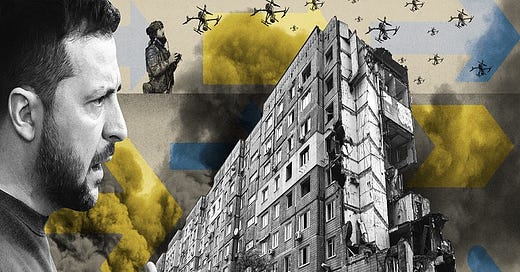The survival of Zelensky’s regime is on the line for the first time since Russia’s “goodwill” gesture of withdrawing its forces from Kiev during spring 2022’s peace talks. If the front lines don’t hold and more aid isn’t forthcoming, then he might be out of power by year’s end.
Zelensky told German media in an interview earlier this week that Ukraine is planning another counteroffensive against Russia, which is why it requires production licenses from its partners in order to build up its domestic military-industrial capacity ahead of that event. He also urged the US to break its Congressional deadlock on Ukraine aid in order to help his country prepare for this next campaign. No counteroffensive is actually planned, however, since Ukraine completely lacks the manpower and arms.
It can’t realistically narrow the yawning gap between itself and Russia, which was only widened since the dramatic failure of last summer’s counteroffensive. Russia already won the “race of logistics”/“war of attrition” with NATO by far, which has dawned on many in the West over the past nine months, hence the renewed interest among some from that bloc for freezing the conflict. Nevertheless, policymakers still want to perpetuate the NATO-Russian proxy war, which his why peace talks have yet to resume.
That approach is increasingly unpopular with the masses, who’ve grown fatigued and frustrated with this conflict, especially after last summer’s failed counteroffensive exposed the fallacy of their hopes to inflict a strategic defeat on Russia. This is particularly the case with the Ukrainians themselves, many of whom know someone who was killed or maimed in one of the meatgrinders. Left unaddressed, these public opinion trends could greatly complicate policymakers’ plans for perpetuating the conflict.
Therein lies the significance of Zelensky’s lie about an upcoming counteroffensive, which aims to advance several objectives, first and foremost misleading his own people by making them think that his regime has a plan for ending the conflict on their terms. They’re unlikely to fall for that though after seeing with their own eyes and hearing from trusted sources how bad everything is going for Ukraine. Even so, Zelensky is so out of touch with his people that he still thinks he can mislead them about this.
The second objective is to deceive the foreign public in order to help relieve some of the pressure upon his Western patrons’ policymakers whose people are nowadays demanding that their politicians devise an exit plan for extricating their countries from what they’ve come to believe is a stalemate. They consider Zelensky to be very ungrateful for all the assistance that he’s hitherto received on the taxpayers’ dime and can’t imagine that anything more could make a military-strategic difference at this point.
These two perception management objectives lead to the third one regarding Zelensky’s desperate need to receive as much aid as he can as soon as possible by deceiving everyone about his side’s plans before Russia achieves a military breakthrough across the front lines. The Ukrainian Intelligence Committee warned in late February that this could happen by as early as the summer, which they also predicted could coincide with nationwide protests that bring an end to his regime.
There’s no chance that Ukraine can muster the men and arms required for carrying out another counteroffensive before then, let alone after Russia’s reportedly forthcoming offensive ends (if his regime isn’t overthrown by then, that is), but there’s a chance that it could survive the onslaught. The only way to improve its odds is to deceive Ukrainians with false hopes about an upcoming counteroffensive so that they don’t protest while deceiving foreigners into supporting more aid.
In other words, the survival of Zelensky’s regime is on the line for the first time since Russia’s “goodwill” gesture of withdrawing its forces from Kiev during spring 2022’s peace talks, which it did out of the naïve belief that this was required to seal the deal for swiftly ending the special operation. He’s scared but he can’t show it and is therefore harnessing all of his acting skills to present a false veneer of confidence. If the front lines don’t hold and more aid isn’t forthcoming, then he might be out of power by year’s end.




